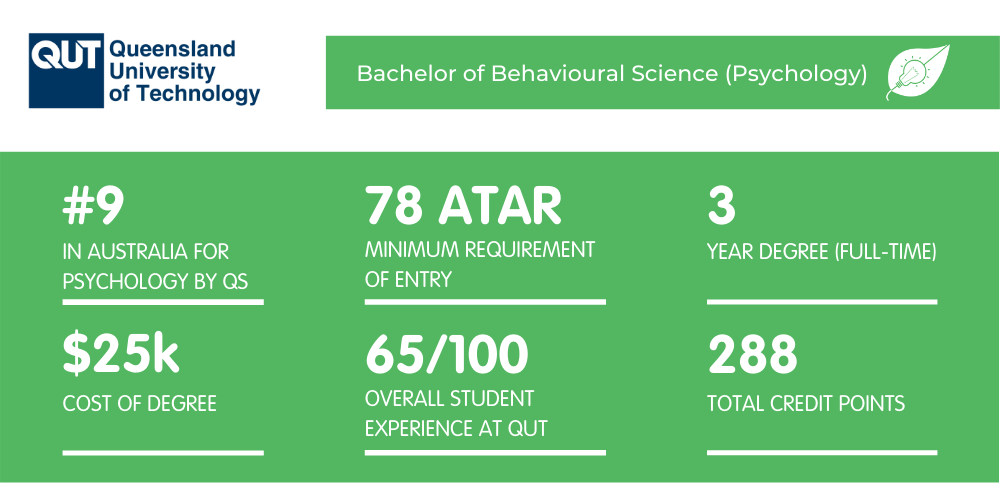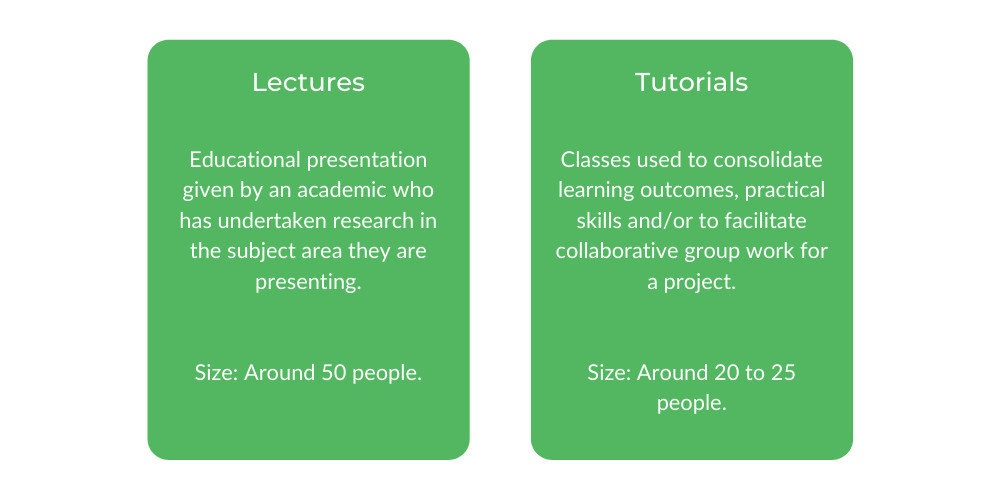Looking into becoming a psychologist? Or, are you interested in understanding the science behind human behaviour? Then, a Bachelor of Behaviour Science (Psychology) at QUT might be the undergraduate degree for you!
This article will go through the core units, the types of classes and classwork, faculty and culture when studying a Bachelor of Behaviour Science (Psychology) at QUT.
Without further ado, let’s dive in!
What is a Bachelor of Behavioural Science (Psychology) at QUT?
Core Units for this Degree
How to Get into a Bachelor of Behavioural Science (Psychology) at QUT
What’s the Teaching Format?
What’s the Faculty and Culture Like?
What is a Bachelor of Behavioural Science (Psychology) at QUT?
A Bachelor of Behavioural Science (Psychology) at QUT provides an understanding of human behaviour, in both physical and emotional terms. Completing Behavioural Science (Psychology) undergraduate provides a foundation of psychological theory, assessment methods and counselling skills, in which graduates are provided accredited by the Australian Psychology Accreditation Council for training in psychology.
Can this degree be studied in conjunction with another? Or studied as Honours?
As Behavioural Science can be applied to a wide range of careers, this undergraduate program is great for studying as a double degree or as the first step to becoming an accredited psychologist. It is not mandatory to be studied as a double degree however, the double-degree options include:
Alternatively, there is the option of studying an additional one-years Honours program, provided graduates have a minimum grade point average (GPA) of 5.0 as well as other requirements listed here.
Career paths
There are various paths that a Bachelor of Behavioural Science (Psychology) at QUT can lead to, which can further be diversified by pursuing a double-degree or postgraduate study. Career options include:
-
- Counsellor
- Family services Officer
- Disability services worker
- Human resources manager (with a Bachelor of Business)
- Market researcher (with a Bachelor of Business)
- Psychologist (requires postgraduate study)
- Social worker (with a Bachelor of Social Work)
- Youth worker
Core Units for this Degree
The 15 core units for a Bachelor of Behavioural Science (Psychology) at QUT are:
-
- Health Needs of Aboriginal and Torres Strait Islander Australians
- Communication for Health Professionals
- Foundation Psychology
- The Mind and The Brain
- Psychological Research Methods
- Counselling Theory and Practice 1
- Social Psychology
- Research Design and Data Analysis
- Development Psychology
- Perception and Cognition
- Advanced Topics in Neuropsychology
- Individual Differences and Assessment
- Psychopathology
- Advanced Statistical Analysis
- Behavioural Science and Contemporary Challenges
These core units are studied throughout the three years of the program and explore areas in research methods, physiology, social and development psychology, and perception and cognition.
First Year
First-year units are a mix of learning foundational psychology, practical skills for health professionals, and research methods.
One interesting first-year unit includes such as The Mind and The Brain, where students learn basic biological-psychological concepts such as perception and memory and there is even an opportunity for research participation!
Second Year
Second-year units mainly focus on theoretical psychology, with additional units on research design and an opportunity to study internationally (or take a psychology elective).
An example of second-year study is the unit Social Psychology, where students explore the influence between individual psychological processes and social settings.
Third Year
The third and last year of study explores research and assessment methods such as through the unit Advanced Statistical Analysis, which teaches data analysis tools essential to psychological psychological practice.
Choosing to Minor or Complete Electives
While taking a Psychology major, students can either take psychology electives or complete a Counselling Practice and Skills Minor, which provides a Level 1 accreditation with the Australian Counselling Association.
Some electives include Alcohol and Other Drug Studies, Psychology in the Community: Placement, and Introduction to Family Therapy.
Are there any work placements?
While not mandatory, the elective unit Psychology in the Community: Placement integrates a 50-hour work placement at an assigned or individually chosen organisation as part of your course.
How to Get into a Bachelor of Behavioural Science (Psychology) at QUT
The ATAR cut-off for a Bachelor of Behavioural Science (Psychology) at QUT is 78.
Alternate Pathways
If your ATAR does not meet the cut-off, you can look into QUT’s adjustment schemes such as Educational Access Scheme and the Year 12 Subject Scheme (list of all the schemes found here).
In particular, the Year 12 Subject Scheme offers a maximum of 8 adjustment points if you have studied:
-
- Specialist Mathematics (Units 3 & 4, C)
- Physics (Units 3 & 4, C)
- Languages other than English
Alternatively, studying a Diploma in Health Science provides pathways into Bachelor of Behavioural Science (Psychology). It can be completed in 8 months with full-time study and requires a lower ATAR of 60.
Assumed Knowledge
There are no additional assessments for entry however, the assumed knowledge is English, or Literature, or English and Literature, or English as an Additional Language (Units 3 & 4, C).
Scholarships
There are a whole bunch of scholarships on offer for students in various circumstances. You can have a look at the different ones available here!
What’s the Teaching Format?
A Bachelor of Behavioural Science (Psychology) at QUT is taught in semesters and in a combination of mostly lectures and tutorials.
Class Structure
Lectures
Lectures are with the entire cohort, however not as many people attend in person. Though it depends on the unit, most classes won’t have over 50 people in person and are typically 2 hours long.
These classes mostly emphasise research studies and theory related to the unit topic, in which weekly concepts slowly become more complex and integrate with problem-solving in real world situations.
Tutorials
In tutorials, people are more likely to show up with about 20 to 25 students attending each class and are typically 1-2 hours long.
Tutorials involve a combination of engaging with lecture topics and practical guidance, where there is an opportunity to work with peers, practice exam questions and occasionally work in laboratory settings. In addition, tutorials are a time for informal feedback on students’ learning progress where in-class activities will help assess their knowledge and development.
How much time do you spend in classes?
In a full-time load of 4 units, the contact hours for this course is around 12 hours in person. However, this can change depending on the units.
What are the assessments like?
In a Bachelor of Behavioural Science (Psychology) at QUT, the main assessments are usually online quizzes, reports, and exams. The weighting of assessment fluctuates between about 20% to 50%.
Online quizzes are typically given at various times during the semester. While each quiz is often low in weighting, these provide indicators to the strengths and weaknesses in your learning related to the course content.
Reports are either research reports or laboratory reports. In a research report, students investigate an area of the unit topic, supported by rationale, methodology and ethical considerations. Laboratory reports use data from the student’s experiment and focus on the analysis of the results.
Exams are usually the final assessment of the unit and typically encompass all the content covered over the semester. There can be a range of theoretical questions, essay prompts and reflections on your research.
Skills That You Refine and Learn
By the end of a Bachelor of Behavioural Science (Psychology) at QUT, graduates have the conceptual skills relating to knowledge of biological, behavioural and cognitive psychology. Essentially, graduates know the ‘whys’ and ‘hows’ behind human physical and emotional behaviour, which they can use in a number of various careers. This skill is mostly learned when studying theoretical units such as Social Psychology and The Mind and The Brain.
As psychology is grounded in ethical and reliable research, graduates will learn how to conduct appropriate research that is relevant to their practice and assessment goals. In units like Advanced Statistical Analysis and Psychological Research Methods, students learn how to optimise their research design and strategies.
Since psychological research has an audience of both professional and non-professional individuals, communication skills are taught in both contexts.
For written professional contexts, working on research reports hone in these skills, as students learn to effectively write complying with the guidelines of the American Psychological Association (APA). For counselling contexts, units such as Counselling Theory and Practice 1 teach practical methods and models when responding in counselling settings.
What’s the Faculty and Culture Like?
Faculty
The Behavioural Science cohort is a small one, though it is part of the larger QUT Health School. Peer-to-faculty interactions have mostly been positive as the teaching staff always try to be warm and welcoming.
Some, though not all, staff have Doctors in Psychology — and it is recommended to look up the QUT staff profiles before enrolling to find a suitable tutor!
At QUT, facilities are shared among all degrees with classes everywhere and most have been renovated, so there is a great interdisciplinary and comfortable vibe to the university!
Culture
At QUT, there is a wide range of clubs, societies and special-interest groups, where you can most likely find a group of like-minded and diverse people!
For psychology-related students, the Get Psyched club is a great way to get involved in some fun activities, where they hold (often sold-out) events such as trivia nights, lunches, social parties and even balls!
Mentorship
There is a great Career Mentorship program at QUT, where students can sign up to a mentor for professional development — however it is not guaranteed that they will be in the same discipline as the student.
Want to learn about the pros and cons of this degree? Check out our article here!
Lynn Chen is a Content Writer at Art of Smart Education and is a Communication student at UTS with a major in Creative Writing. Lynn’s articles have been published in Vertigo, The Comma, and Shut Up and Go. In her spare time, she also writes poetry.






